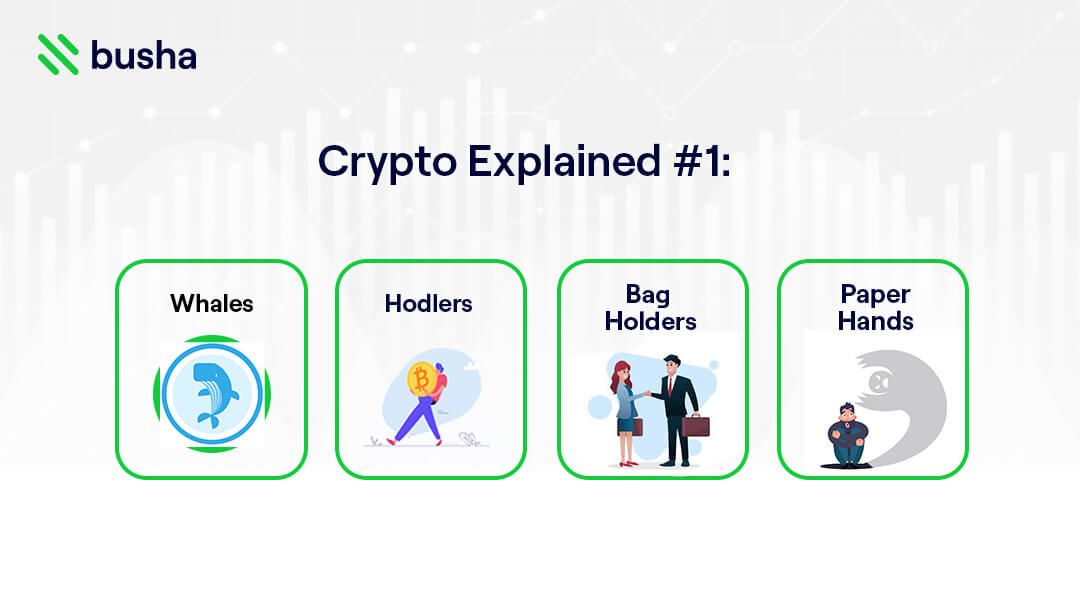
Crypto Explained #1: Whales, Hodlers, BagHolders, Paper Hands
For starters, many crypto users often start as paper hands and progress to hodlers depending on their level of research upon entry into the space. Some enthusiasts grow and manage their portfolio excellently using exchanges like Busha and never have to become bagholders.
DING DONG!
Welcome to another day in 2022 where ignoring new developments and technologies only leads to more problems and questions like why are they spelling hold as hodl? Or why do my friends keep calling Kachi a crypto whale when he is trading BTC?
Hey there, It’s about time you get to know some of these key personalities/traits and how you might actually fall under one, some or none at all (which frankly is not advisable).
Crypto Whales
Real-life whales are considered the largest animals to exist on earth, considering both land and aquatic habitats, and the same can be said about “Crypto whales”.
Looking back between 2013 and 2015 when early Bitcoin adopters/enthusiasts fought for recognition, acceptance,and inclusion into the financial ecosystem, a lot of people still hadn’t woken up to a reality where big banks and governments weren’t in full control of money.
Fast forward to now, these early adopters and investors control over 1% of major cryptocurrencies in circulation and storage.
A Crypto whale is a person with enough crypto coins or tokens to cause a significant impact on the market prices, either by buying or selling large amounts. These individuals hold a considerable large amount of one particular cryptocurrency that gives them an edge in creating a pump (increase in price) in market activity, and high demand. With no set amount to consider an individual as a whale, the Bitcoin community usually refers to anyone with more than 1000 BTC as a whale.
Most crypto whales create huge buy orders on the market at higher prices, thereby raising the price of the coin.
Hodlers
Wrong spelling or a crypto slang you’re yet to come across?
The answer is both! HODL (Hold on for dear life) is a term derived from the word hold. In a 2013 Bitcoin forum, a user mistakenly typed the word Hodl rather than hold while in a rush, and ever since crypto investors adopted the word to mean hold on for dear life.
Hodling explains a process or action where crypto enthusiasts or buyers hold on to one more cryptocurrency for a long period.
Crypto hodlers unlike whales aren’t necessarily early adopters or huge amount holders whose actions affect market activity. For hodlers, the long haul, future potential, and asset interoperability is the name of the game. They scout, research, buy and hold onto cryptocurrencies irrespective of their price and performance.
The idea here is to hold the position/quantity of a coin rather than sell it in a panic if volatility increases.
Bagholders
Almost similar to a hodler combined with a whale, an individual or crypto investor who holds to very large amounts of any cryptocurrency for a long time refusing to sell despite the price changes is often referred to as a bag holder. The difference however is that these individuals wait until the coin or token is about to fail and finally resort to selling, hence the title “bagholders”.
For most bagholders, the price of the crypto coin doesn’t matter as they are either ignorant of market value or waiting for an opportunity to sell their large shares at a higher price. They often lose a lot of money in a plight to see their failing asset make a big rebound.
Paper hands
The term paper hand describes an individual, investor, or risk-taker who immediately withdraws, sells, or opts out of an investment at the first sign of volatility and pressure. Paper hands exist across many ecosystems and the crypto community has its fair population of low-risk individuals.
Paper hands may come in the form of crypto traders, holders, and enthusiasts. They fear that once a crypto asset loses value from what they initially bought it at, they should immediately sell it off to avoid any further losses.
For starters, many crypto users often start as paper hands and progress to hodlers depending on their level of research upon entry into the space. Some enthusiasts grow and manage their portfolio excellently using exchanges like Busha and never have to become bagholders.

